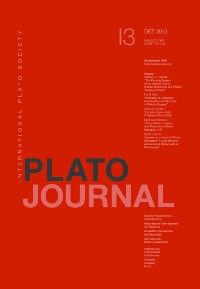Please use this identifier to cite or link to this item:
https://hdl.handle.net/10316.2/34672| Title: | The missing speech of the absent fourth: reader response and Plato’s Timaeus-Critias | Authors: | Altman, William H. F. | Issue Date: | 2013 | Publisher: | Sociedade Internacional de Platonistas Imprensa da Universidade de Coimbra |
Abstract: | Recent Plato scholarship has grown increasingly comfortable with the notion that Plato’s art of writing brings his readers into the dialogue, challenging them to respond to deliberate errors or lacunae in the text. Drawing inspiration from Stanley Fish’s seminal reading of Satan’s speeches in Paradise Lost, this paper considers the narrative of Timaeus as deliberately unreliable, and argues that the actively critical reader is “the missing fourth” with which the dialogue famously begins. By continuing Timaeus with Critias—a dialogue that ends with a missing speech—Plato points to the kind of reader he expects: one who can answer Critias’ question (Critias 107a4-6): ὡς μὲν γὰρ οὐκ εὖ τὰ παρὰ σοῦ λεχθέντα εἴρηται, τίς ἂν ἐπιχειρήσειεν ἔμφρων λέγειν; | URI: | https://hdl.handle.net/10316.2/34672 | ISSN: | 2183-4105 | DOI: | 10.14195/2183-4105_13_1 |
| Appears in Collections: | Plato Journal |
Files in This Item:
| File | Description | Size | Format | |
|---|---|---|---|---|
| pj13_artigo2.pdf | 390.72 kB | Adobe PDF |  |
Items in DSpace are protected by copyright, with all rights reserved, unless otherwise indicated.
